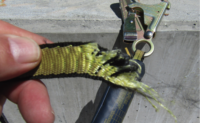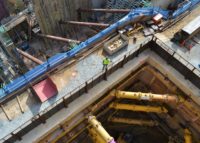Jesse Ely, a union ironworker, can thank a net designed to catch falling debris for saving his life after a harrowing fall from the edge of a Seattle high-rise building. On April 30, Ely plummeted 80 ft from the building’s 20th floor.
Now at home and undergoing rehabilitation, Ely faces a long recovery from severe injuries that include several broken bones, dislocated limbs and severed arteries. A GoFundMe campaign started for him, his wife and their two children has already raised $28,593. His employer, the Erection Co., has continued to pay his salary and has created a fund to which the company and its employees make donations, said Lance Richotte, chief executive.
The net, designed to catch pieces of plywood, plaster and other odds and ends, prevented Ely’s death even though it isn’t designed for that purpose. In addition to requiring contractors to provide perimeter fall protection through safety nets, guardrails or harnesses, federal workplace safety rules require employers to protect workers from holes, including skylights, 4 ft or more above a lower level. Safety nets intended to provide fall protection should be no more than 30 ft below the areas where workers are active, according to federal safety rules. The net must extend beyond the outermost reaches of the work area by 5 to 10 ft and withstand a drop test using a 400-lb, 28- by 32-in. bag of sand.
The building where the accident occurred will be 40 stories tall and used by Amazon, the internet commerce giant. It is in the middle of a multibuilding construction program in Seattle.
Exactly what occurred during Ely’s accident isn’t clear, and state safety investigators and city officials are still reviewing the mishap. The Erection Co.’s Richotte said he could not comment until the investigation is finished. But a perimeter guardrail had been installed on the floor where Ely was working.
According to Christopher McClain, business manager of ironworkers’ Local 86, Ely was in the middle of “shaking out steel” that had been delivered when he stepped into an opening at the perimeter and effectively slipped under the guardrail. “He put his foot through it and gravity took over,” McClain said. “He was very, very fortunate.”
Close to Terminal Velocity
The net that broke Ely’s fall had a capacity to hold 300 lb of falling debris. When the 170-lb ironworker hit the net, he “was close to reaching terminal velocity,” McClain noted.
Ely’s co-workers called the Seattle Fire Dept. at 10:52 a.m. that morning, according to the dispatcher’s report, and he was still conscious five minutes later despite his severe injuries. By 11:50 a.m., the rescue crew had managed to get Ely on the ground, where he was rushed to Harborview Medical Center.
McClain credits the workers who installed the debris net for giving it the necessary strength to save Ely’s life. “Due to their experience and the welds they applied,” the net system held, McClain said. “It was not made for what it did.”
Jesse “is a great guy and everyone likes him,” McClain said. “It was a terrible moment for us.”
And a terrible moment for Katie Ely, Jesse’s wife, who posted her feelings on Facebook as Ely was treated at the hospital. “He stopped breathing a couple of times because of all the pain medication he’s on,” she wrote. “He’s in ssssoooo much pain it’s unreal of how much he’s had to go through. It’s so hard to watch and knowing there is nothing I can do to take away the pain … P.S. I’ve been crying so much I can barely see what I’m typing so I apologize for any spelling errors …”
After surgical procedures on his arm, leg and arteries, Ely was still facing surgery on his knee, according to an update on the fundraising page.
State workers’ compensation laws vary, but wage replacement usually begins several days after an accident. The replacement amount is usually two-thirds of the worker’s average wage and is not subject to tax, with a ceiling on the total amount. In Washington state, where both workers and employers pay into the system, the benefit is about 60% to 70% of wages, paid every two weeks, provided a physician certifies the worker’s disability each time, according to the state Dept. of Labor & Industries.
By keeping Ely on the payroll at full salary, the Erection Co. has ensured that Ely continues to get his full medical benefits and contributions to his union retirement plan, said McClain. But McClain said the Erection Co. had no legal obligation to do what it has done after the accident. Had it not, Ely would have only been entitled to payment under a state plan providing roughly 55% of his salary, McClain said.
The GoFundMe page set up by supporters has more than tripled its original goal of $8,000, raising the money from 337 donors.







Post a comment to this article
Report Abusive Comment